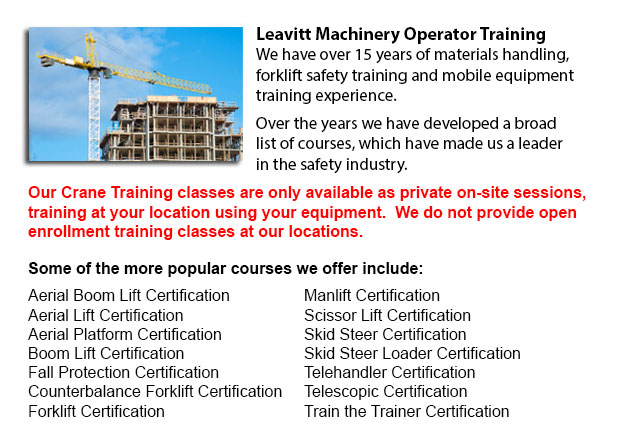
Barrie Crane Safety Training - Both crane operator as well as their employers need to be aware of all the possible issues related to the use of an overhead crane. All across North America, there is legislation which provides regulation for the safe operation, inspection and maintenance of lifting machines. Crane Safety courses help owners and managers of cranes accredit their drivers based on the provincial legislation.
We have designed numerous training courses to be able to equip operators with the knowledge and skills needed to be able to make crane lifting safer and easier. Operator training really helps to extend the crane's life span by guaranteeing crane's safe operation and high performance.
Accredited operators are required to operate and run articulated cranes under 16,000 lbs. capacity. The articulated crane operator should know about the numerous operational features and characteristics of the machinery. Before use, a pre-operational equipment check should be performed. There is a legal prerequisite to perform a pre-operational inspection and a check of the overhead conditions and work-site ground.
The manufacturer's directions provide information regarding maintenance and inspection, unloading and loading of the crane. The law requires daily and annual checks. Drivers are required to maintain an up-to-date logbook in nearly all regions. They may be needed to validate equipment warranties.
It is recommended that companies include remote control devices to their cranes. Remote control improves safety by enabling the driver an easier option for handling the crane.
Placing a high priority on crane safety helps a company's bottom line. Companies which follow safe equipment practices normally enjoy greater cost savings compared to those which don't. The risk of personal injury and equipment damage is greatly lessened when a well trained driver is handling the crane. Safety conscious drivers are more productive resulting in reduced times needed for loading and unloading.
-
Barrie Warehouse Forklift Safety Training
Barrie Warehouse Forklift Safety Training - Businesses normally face liability for injuries and damage sustained in workplace accidents. Warehouses can be hazardous places to the individuals who work there. That is the reason why employee safety is a... More -
Barrie Aerial Platform Training
Barrie Aerial Platform Training - Aerial lifts can accommodate many duties involving high and tricky reaching places. Normally used to carry out regular upkeep in buildings with high ceilings, prune tree branches, hoist heavy shelving units or mend p... More -
Barrie Forklift Ticket
Barrie Forklift Ticket - Pallet jacks and lift trucks are both intended for practically the same reason; to transfer goods from one location of your warehouse to another. This is basically where the comparison stops however. With the pallet jack, the... More -
Barrie Aerial Lift Training
Barrie Aerial Lift Training - An aerial work platform is a mechanized access platform. This machinery provides access to otherwise not accessible places for people or equipment. Also referred to as an aerial device or elevating work platform, the mac... More -
Barrie Aerial Boom Lift Training
Barrie Aerial Boom Lift Training - For people who operate or supervise the use of aerial lift platforms, correct aerial boom lift Training is required. The aerial lift platform is utilized for lifting individuals, tools and materials to elevated work... More -
Barrie Manlift Certification
Barrie Manlift Certification - The Elevated Platforms and Manlifts Certification program helps to provide the needed training on the work practices, safe operating procedures, rules and regulations regarding the everyday activities for the operators... More -
Barrie Overhead Crane Certification
Barrie Overhead Crane Certification - The overhead crane training certification course is designed to be effective with all participants regardless of literacy or language limitations. The course has two parts: a classroom training session and a prac... More -
Wheel and Track Loader Training in Barrie
Lift trucks are obtainable in several various units that have varying load capacities. The majority of typical lift trucks utilized in warehouse settings have load capacities of one to five tons. Bigger scale models are used for heavier loads, such a... More

Forklift Certification Barrie
TOLL FREE: 1-888-254-6157
Barrie, Ontario
forkliftcertificationbarrie.com
Email Us
About Us


